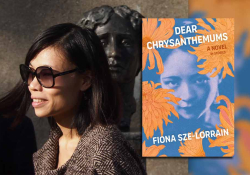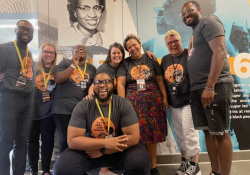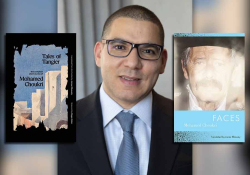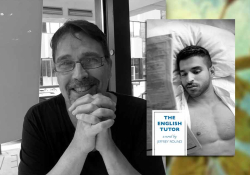Recalling and Reimagining Vietnam: A Conversation with Genaro Kỳ Lý Smith
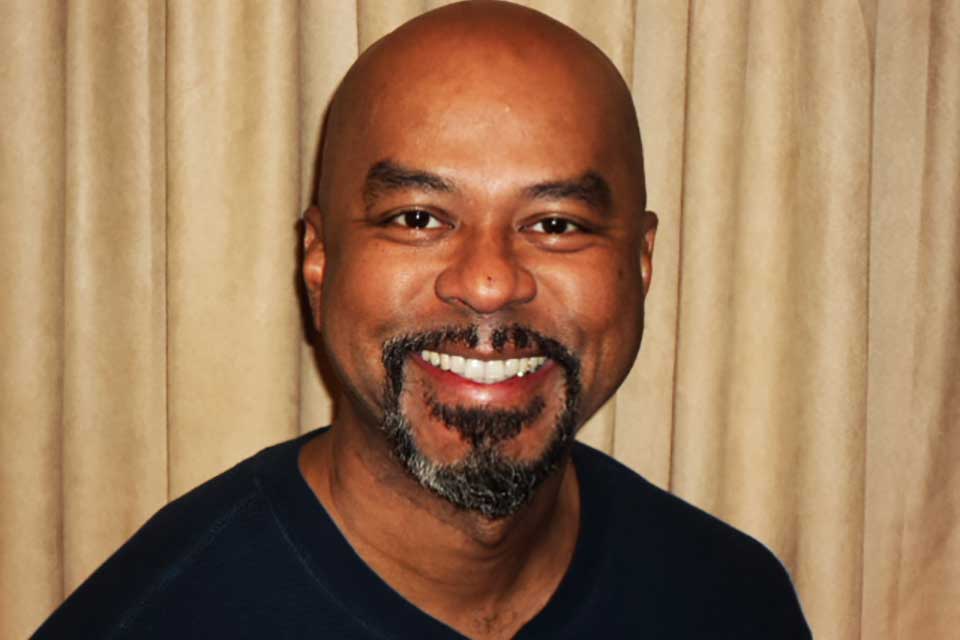
Genaro Kỳ Lý Smith was born in Nha Trang, Vietnam, and raised in California. His first book, The Land Baron’s Sun: The Story of Lý Loc and His Seven Wives, won the 2015 Indie Book Award for best poetry collection. His other works include The Land South of the Clouds and The Beautiful Ones Are Not Yet Born. He earned an MFA from McNeese State University and has taught creative writing at Louisiana Tech University since 1999.
Mary E. Adams: Your first book, The Land Baron’s Sun: The Story of Lý Loc and His Seven Wives, focuses on your grandfather’s life, loves, and, ultimately, his years of hard labor in a reeducation camp. Why did you need to tell his story?
Genaro Kỳ Lý Smith: I learned by the age of thirty just how much of his life was kept from me, the hardships he had to go through. Lý Loc was once rich, powerful, and all of that was gone after the fall of Saigon. You’re looking at a man who owned so much land, who had seven houses, seven wives, twenty-seven children, who was a major commander for the South Vietnamese army. To have to write a letter to my mom in America begging for money is a lowly place to be. All of the sudden, out of your twenty-seven children, you have one in America who works at a sweatshop making dresses, blouses, and slacks for fifty cents per item stitched, and you’re asking her for money in order to eat, in order to be clothed. That’s the thing I had to deal with growing up, knowing he lived the rest of his life as a poor person.
Adams: Why did you decide to tell his story, their story, through poetry?
Smith: I like the idea of telling a person’s story through poetry. I think it’s from my poetic attachment to the lyrical and mythical poets of Asia, poets like Li-Young Lee, Russell Leong, Kimiko Hahn, Garrett Hongo, and Cathy Song. I wanted the challenge of writing poems because I’m primarily a fiction writer. And I like what I did with The Land Baron’s Sun. Like the aforementioned poets, there is an underhanded tenderness we bring to the brutality of war, to identity crisis, to belonging, even to whom we love.
Adams: What did you know about the wives as you began to write? How much had your mother told you about them?
Smith: It was liberating to re-create their lives through poetry. I don’t know what their lives were like after the war—where they lived, how they lived. My mother never told me what happened to them. I reimagined what it was like for them to live in a Communist society with their husband in a reeducation camp. What kinds of lives were women afforded during communism? What measures would they take to survive? These stories aren’t false in a sense; they came from newspaper and magazine articles I’d read from childhood throughout high school and college. I reimagined their lives as one working as a prostitute, one censoring incoming and outgoing letters at the post office, one working at a salt mine. I had to create their lives and make them believable.
Adams: Their stories are particularly believable. “The Fisherman’s Wife,” for instance, is a moving account of Mai, Lý Loc’s Monday wife, who now guts fish for a new husband. You captured their changes in lifestyle, as well as in mind-set, in this highly censored world. A world where one wife now risks everything to create art.
Smith: I was always fascinated with that idea of censorship. Letters sent by my mom to Vietnam were always censored (we didn’t find that out until the late 1980s), and any letters from Vietnam were blackened out. Big brother censored what they wanted the people in Vietnam to know about America, what they wanted America to know: that everything is great in Vietnam. It tears me apart to know that all the care packages my mom sent never made it to my grandfather. Like aspirin, for instance, and he couldn’t get that. That was the initial thing that interested me about big brother. But whether it’s China or Vietnam or even Cuba where art was killed, you have these underground artists who want to perform, to execute their art forms because it made them feel alive. It was a reminder of time before oppression. It’s a powerful thing to want to remember what it was like to be human.
Letters sent by my mom to Vietnam were always censored (we didn’t find that out until the late 1980s), and any letters from Vietnam were blackened out.
Adams: That desire to be human, to maintain dignity even when powerless, is seen in the poems devoted to Chan, your grandfather’s lifelong servant. He is perhaps the most emotionally deep of all the figures. How did you so fully connect to him?
Smith: My mother was disowned by Lý Loc for marrying a black man. A couple of days a week, she would open her front door on the military base, and there would be a basket of fruits, vegetables, fish, and she didn’t know where it was coming from. Until one day she, by chance, opened the door and saw Chan walking away. And she realized that her father was sending his servant to deliver these items because, even though he had disowned her, he still loved her. Chan was that connection between father and daughter. Hence, I saw him as that connection between life and death, particularly when he is led to his execution and there is a calmness he exhibits that unnerves the executioner.
The other reason why I think I connected so well with Chan is because he is Chinese, and therefore an outsider, displaced in a sense. But when given the opportunity to return to Yunnan Province (which means “land south of the clouds”), he would not abandon his adopted country.
Adams: The cover of your novel The Land South of the Clouds calls it a companion piece to The Land Baron’s Sun. How do the two works fit together?
Smith: The Land South of the Clouds take place in Los Angeles, where you have Lý Loc’s daughter living with her American husband and young son. While Lý Loc is living in a reeducation camp, she is living the American dream: a house with a small garden, two-income household, a car, celebrating holidays, and so forth. It’s comparing her life in America to his life in Vietnam. You have a reversal of fortune. You have a man who had everything—wealth in land, money, and a huge family—only to crumble under the weight of communism, and on the flip side of that, you have a daughter who is flourishing in America. Though what she and her husband earn from their blue-collar jobs isn’t much, they’re better off, and there is that sense of guilt for having left a country where her family is suffering the consequences.
There is a third book in the trilogy; it’s called Napalm Lullaby, and I have 130 pages written. It’s a prequel about how my parents got together during the war. It’s going to be a while before it’s published, but it takes place in Vietnam during the war, how Wil Stiles courted Vu-An, and how they had to elope because Lý Loc did not like the idea of her being with a black American Catholic. It’s the mortar of the first two books.
Adams: The main character in The Land South of the Clouds is Vu-An’s son, Long-Vanh, who narrates the effects of war, of Lý Loc’s reeducation, on this family. In many ways, this is Long-Vanh’s coming-of-age story. I see this book as having an entirely different audience from what the poetry might attract. In many ways, this is a young-adult novel about cultural alienation.
Smith: Yes, it’s about coming into your own identity and figuring out who you are. That’s a major part of the novel. Sure, you have this mom who wants to abandon her son and return to Vietnam. But in the middle of the book, the subplot, there is a scene where Long-Vanh has been in a relationship and the woman breaks up with him because she feels she couldn’t handle the stares and comments or any confrontations from being married to “the other,” so Long-Vanh doesn’t know where he fits in. So part of the novel is about identity, how he and Phuong (his cousin who is also of mixed race) don’t know where they fit in with American society.
Growing up, I lived in an area of Los Angeles comprised of American GIs who married war brides, so it was normal to be around white, black, and Hispanic men who married women from China, Korea, Japan, Cambodia, Laos, and the Philippines. It was normal to grow up with such a mix of people, especially the children they had because I was the same as them in terms of racial makeup. I never thought about identity until I was in college and it was time to date. It’s not until you start dating, until you try to find that soul mate, that you realize, racially, where you fit in. I was such an outcast throughout college. I had no idea how difficult it would be.
Adams: The Land South of the Clouds is grounded in your family’s history, but so much of your own life is clearly at play here. What percentage of this novel is autobiographical?
Smith: I get that a lot. My mother worked at a sweatshop. My father was a janitor at the community college he attended. We lived in Los Angeles. But there is no Uncle Ngo. He is still in Vietnam; all of my mother’s siblings stayed in Vietnam. The novel takes one lie that my mom told in real life and retells it so that she returns to her father, who has been in a reeducation camp. So 70 percent of the story is made up. It’s snippets of my childhood that I wanted to bring to life; those snippets are embellished, exaggerated. But at the same time, it is so close to truth. Seventy percent is made up, but the 30 percent hurts.
Adams: Long-Vanh is abandoned by his mother, but he has felt alienated from her all along, and a key aspect of that alienation is the language barrier. He wants to learn Vietnamese, but she won’t teach him. Is that language barrier an autobiographical element?
Smith: When I was eight years old, I approached my mom and asked, “Can you teach me Vietnamese?” She said, “No, you’ll get it wrong.” I’m tone deaf, and the Vietnamese language is tonal. You have to have the right accent, the right emphasis. If you get it wrong, you will be misunderstood. That’s a key part of the novel: being misunderstood.
Through reading, I realized how sheltered I had been—how sheltered our generation had been—from Vietnam.
Adams: My dad was stationed in Nha Trang, but I didn’t understand that the war had affected our day-to-day lives until I was a graduate student, reading the poetry of Bruce Weigl. Through reading, I realized how sheltered I had been—how sheltered our generation had been—from Vietnam. Who are some of the writers who inspired you to take on this subject?
In 1992 a friend loaned me Robert Olen Butler’s A Good Scent from a Strange Mountain, and that was it. That was absolutely it.
Smith: Jack Lopez, my first fiction professor as an undergrad at Cal State Northridge, asked me what sort of literature and films about the Vietnam War I had read or watched. I told him Apocalypse Now, Platoon, and Coming Home. Jack Lopez told me point blank that Apocalypse Now was BS, and in that moment, I knew what he meant. He told me that I had stories that had not been written, that I must draw on what I could recall. He said that I needed to read books by those who had been there, by people from there, and then I would know what to do. He handed me Paco’s Story, by Larry Heinemann. When I finished it, he handed me Tim O’Brien’s The Things They Carried, and then Robert Stone’s Dog Soldiers. In 1992 a friend loaned me Robert Olen Butler’s A Good Scent from a Strange Mountain, and that was it. That was absolutely it. I looked into everything about Butler, where he taught, and I applied for grad school to McNeese, and he called my parents’ home asking for me. That was the golden seal for me.
Adams: Ultimately, what has your own writing taught you about Vietnam—about what you didn’t know and about what you needed to know?
I thought, if I hadn’t decided to become a writer and to write about the little things I recalled, they would have died and their stories would have also.
Smith: My parents did not talk about Vietnam at all. I didn’t learn about the seven wives until I was thirty years old. I was writing the title chapter of The Land South of the Clouds, where Lý Loc is talking about his various women, and while writing that chapter, I realized that, at one point, I was in a house filled with women, and it suddenly came to me. I called up my mom, and I said, “For years, you told me those women living in the house were nursemaids. They weren’t nursemaids, were they? They were your dad’s mistresses.” That’s when she broke down and said, “No, they weren’t mistresses; they were his wives.” And I said, “Wives? How many?” “He had seven.” I said, “Mom, I’m thirty years old, and you are just now telling me that your dad had seven wives. Why didn’t you tell me this?” She said, “I was embarrassed; I believe in monogamy, one husband, one wife.”
After I had graduated with an MFA and published several chapters and stories about the war and my family in Vietnam, my parents realized I was serious about writing. That was when they decided to open up. They told me stuff I had no clue about, and I thought, if I hadn’t decided to become a writer and to write about the little things I recalled, they would have died and their stories would have also. I wouldn’t know anything about Vietnam or my family heritage and history.
June 2019

